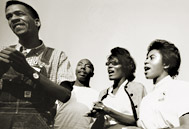
Mary Church Terrell: Advocate for African Americans and Women
This collection from the LOC consists of approximately 13,000 digitized documents of "educator, lecturer, suffragist, and civil rights activist Mary Church Terrell (1863-1954)."

Contains internal memos, legal briefings, and direct action summaries from national, legal, and branch offices throughout the country. It charts the NAACP's work and delivers a first-hand view into crucial issues. Content from 1909 - 1972.
A chorus of Black student voices that renders a new story of US education-one where racial barriers and violence are confronted by freedom dreaming and resistance Black students were forced to live and learn on the Black side of the color line for centuries, through the time of slavery, Emancipation, and the Jim Crow era. And for just as long-even through to today-Black students have been seen as a problem and a seemingly troubled population in America's public imagination... By peeling back the layers of history, Givens unveils in high relief a distinct student body- Black learners shaped not only by their shared vulnerability but also their triumphs, fortitude, and collective strivings.
For two years an aging Dr. Horace Tate--a former teacher, principal, and state senator--told Emory University professor Vanessa Siddle Walker about his clandestine travels on unpaved roads under the cover of night, meeting with other educators and with Dr. King, Georgia politicians, and even U.S. presidents. Sometimes he and Walker spoke by phone, sometimes in his office, sometimes in his home; always Tate shared fascinating stories of the times leading up to and following Brown v. Board of Education...The Lost Education of Horace Tate is a monumental work that offers fresh insight into the southern struggle for human rights, revealing little-known accounts of leaders such as W.E.B. Du Bois and James Weldon Johnson, as well as hidden provocateurs like Horace Tate.
In this first full-length biography of Benjamin Mays (1894-1984), Randal Maurice Jelks chronicles the life of the man Martin Luther King Jr. called his "spiritual and intellectual father." Dean of the Howard University School of Religion, president of Morehouse College, and mentor to influential black leaders, Mays had a profound impact on the education of the leadership of the black church and of a generation of activists, policymakers, and educators.
Black college presidents in the era of segregation walked a tightrope. They were expected to educate black youth without sufficient state and federal funding. Yet in the African American community they were supposed to represent power and influence and to be outspoken advocates of civil rights, despite the continual risk of offending the white politicians on whom they were dependent for funding. The dilemmas they faced in balancing these conflicting demands have never been fully examined. Gerald Smith's study of the long-time president of Kentucky State College helps fill that void.
In this wise, introspective, and touching memoir, Dr. Ethel Hall recounts the little "journeys" throughout her life which prepared her to become the first African American woman elected to the Alabama State Board of Education. Her experiences with racial tension, discrimination, and poverty are interspersed with portraits of the family and love which transformed her from a farmer's daughter-determined to achieve the higher education others thought to be impossible-to a dedicated mother and educator, and even further to a statewide political leader. Dr. Hall also provides a detailed account of the problems faced-both during her more than two decades of service to the Alabama State Board of Education.
The story of Madeline Morgan, the activist educator who brought Black history to one of the nation's largest and most segregated school systems A Worthy Piece of Work tells the story of Madeline Morgan (later Madeline Stratton Morris), a teacher and an activist in WWII-era Chicago, who fought her own battle on the home front, authoring curricula that bolstered Black claims for recognition and equal citizenship. During the Second World War, as Black Americans both fought to save democracy abroad and demanded full citizenship at home, Morgan's work gained national attention and widespread praise, and became a model for teachers, schools, districts, and cities across the country.
This book fills a void in the scholarly treatment of Alain Locke by providing the reader with a comprehensive view of Locke's vision of mass, and adult, education as instruments for social change. It is representative of the remarkable optimistic manifesto of 1925 in which the New Negro, by virtue of a cosmopolitan education emphasizing value pluralism, would become a full participant in American culture.
800 biographical essays on black American women from colonial times to the present. Essays include references and, when available, description and location information for primary sources. Volume one includes a "Content by Area of Endeavor" section and a subject index. Volume two includes an occupation index, geographical index, subject index, as well as addresses for biographees who are still living.
500 biographical essays on men both living and dead. Includes geographic, occupation, and subject indexes.
Biographies of individual black women, topical essays (e.g., "Slavery," "Class," and "Jim Crow Era") as well as essays on the status of black women in various chronological periods.
This collection combines the authority of carefully edited reference works with sophisticated technology to create the most comprehensive collection of scholarship available online to focus on the lives and events which have shaped African American and African history and culture. Content includes:
 The design of this page was adapted in part from Research: By Course, Subject, or Topic, by University of Arizona Libraries, © 2020 The Arizona Board of Regents on behalf of The University of Arizona, licensed under a Creative Commons Attribution 4.0 International License.
The design of this page was adapted in part from Research: By Course, Subject, or Topic, by University of Arizona Libraries, © 2020 The Arizona Board of Regents on behalf of The University of Arizona, licensed under a Creative Commons Attribution 4.0 International License.
